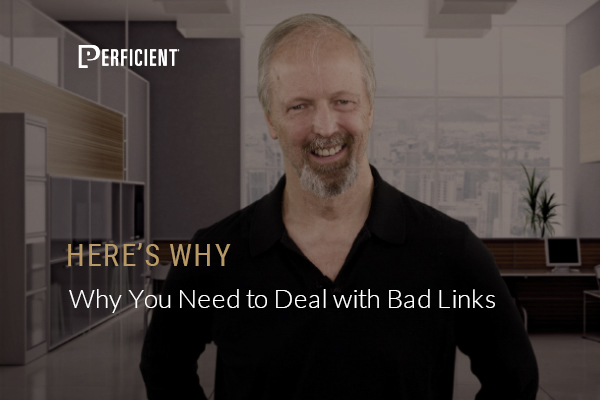You’ve received many bad links to your site and worry if they’ve negatively affected your SEO. Is it time to clean up all those links, and how should you start?
In this episode of the award-winning Here’s Why digital marketing video series, Eric Enge explains when and how you should deal with bad links.
Don’t miss a single episode of Here’s Why. Click the subscribe button below to be notified via email each time a new video is published.
Resources
Transcript
Hey, everybody. Eric Enge here, Principal in the Digital Marketing group at Perficient Digital. I’m going to talk a little bit about when you need to deal with bad links and how to deal with them. But first of all, let’s really talk about the problem.
First of all, you could have a number of “bad actors” out there linking to you, and there’s a whole conversation people have about negative SEO and whether negative SEO is being done to your site. To define what that means, are people deliberately sending poor quality links to your site that they think might cause Google to penalize your site as a tactic to improve their position in search by lowering yours?
Google says this is not real. I think there’s some debatability about that. I do think people try to do this. I’m not sure how well they do it or how effective it is. Personally, I’d rather spend my time building the value of my site rather than attacking competitors’ sites one-by-one for a lot of reasons, not to mention the ethical reasons that are part of that.
But regardless of all this, all sites do accumulate some bad links, so doing something to clean up those links from time to time feels like a good idea. To do that, you want to use a thing called a disavow file within Google. This is a file you can submit within Search Console that will tell Google what links you don’t want to receive any credit for. The idea is to scan through all your bad links, find those bad links, and put them in the disavow file. Then, in theory, they’ll no longer be a problem for you.
Google does tell us that disavow files get greatly overused, and we have seen that too. You need to be very careful not to be regularly dumping things in disavow files without the right level of scrutiny to make sure you’re not actually disavowing good links in the process. So, you need to be very judicious about how you use disavow files.
But when should you, really? From our point of view, maybe quarterly or twice per year, you can scan through your links and identify those that are obviously crappy links. Here are some examples. Let’s say your services are only offered in the United States. Then, you don’t really need a lot of links from Asia or other parts of the globe where you don’t offer any services. It’s not really any value to those links, most likely. Another example is links that are completely unrelated to your service, links from porn sites, or any other links that clearly don’t add value and that are low authority in nature.
Those are the kinds of things that you would look for. But again, you want to be cautious that you’re not disavowing something that’s actually a useful, truly organic link. That’s one of the things to think about and look for, too, is an understanding as to whether that link is organic and genuine. That’s our general guidance on all that.
But when you disavow, if you decide that there’s a domain linking to you that’s of poor quality, what you want to do is actually disavow the entire domain, not just a specific page you find that’s linking to you. That’s really important because the back-linking tools that you would use to find out who’s linking to you aren’t able to crawl the web comprehensively, and they may only report on one or two links on a given domain. If you don’t disavow the entire domain and only disavow the individual link, then the other problem links on that domain would still be pointing to you and potentially a problem.
But again, remember, use your disavow file very, very judiciously. There are many ways to use it to harm you. Google calls it an advanced feature for a reason. You have to use it the right way.
Don’t miss a single episode of Here’s Why. Click the subscribe button below to be notified via email each time a new video is published.
See all of our Here’s Why Videos | Subscribe to our YouTube Channel

